Leaning over their computers and flipping through notebooks, several counsellors are busy comparing notes and discussing how to help dozens of girls and women sitting in different rooms at the one-stop centre for survivors of gender-based violence (GBV) in Bosaso.
The United Nations Population Fund (UNFPA) in April 2021 launched the One-Stop Centre and the Women and Girls’ Safe Spaces (WGSS) for survivors of Gender-Based Violence (GBV) in the Bosaso port city of the Puntland State of Somalia to improve access to services for survivors of GBV.
The GBV One-Stop Centre and the WGSS conveniently located inside Bosaso General Hospital provides safe spaces for girls and women. One-stop services represent a promising model for providing comprehensive care to GBV, offering medical, legal and psychosocial services within one location; a hospital or a stand-alone centre.
Somalia is currently facing multiple emergencies; floods in some areas, drought, locusts and the COVID-19 pandemic. The emergency situation is increasing incidences of intimate partner violence and sexual violence. GBV occurrences are most likely to worsen as more women and girls suffer multiple displacements, loss of live livelihoods, food insecurity, sexual abuse and exploitation, poor access to markets and water insecurity.
“The GBV One-Stop Centre in Bosaso is part of the GBV response to emergencies triggered by repeated patterns of inconsistent climate conditions and clan conflicts,” explains UNFPA Gender and Youth Analyst in Garowe, Mr. Kamal Abdukadir.
In Puntland, 15 percent of women aged between 15 and 49 have experienced physical violence since the age of 12. The most common forms of GBV in the region include rape/gang rape, domestic violence, early marriage and female genital mutilation (FGM), according to the Puntland Statistics Department report of 2020.
“Activities of the GBV one-stop centre cover the critical spectrum of care and support. The interventions include prevention, medical treatment and care for physical bruises, clinical management of rape, psychosocial counselling, and referrals support for legal assistance and prosecution,” says Mr. Abdukadir.

a GBV survivor interacts with a counsellor
Since its launch, a total of 51 GBV survivors have received psychosocial support services (PSS), 15 GBV survivors have accessed medical services, three have been provided with the clinical management of rape (CMR) services, 32 survivors have received reintegration skills in tailoring and beauty skills and eight GBV survivors have been provided with safety and security services.
For Instance, Filfilo Ali (not her real name), 25 years old, had physical injuries from domestic violence meted by her husband. The injuries triggered a miscarriage, and she lost her unborn baby. Ms. Ali developed depression. Luckily, some of her family members took her to the GBV One-Stop Centre. She was provided with free medical care, psychosocial support, and reintegration skills within two months.
TAAKULO, a non-governmental organization dedicated to helping disadvantaged people and communities throughout Somalia, manages the GBV one-stop centre with financial support from UNFPA Somalia.
Speaking at the launch of the one-stop centre in Bosaso, TAAKULO project manager, Ms. Fatima Said, expressed optimism that the centre, operating within the city’s general hospital and has well-trained staff, will help to address difficult situations that the GBV victims experience.
“We are very appreciative of the efforts by various stakeholders, government authorities and civil society organizations to respond to GBV. They provide timely access to health, legal and psychosocial services, skills training and material support to survivors of GBV and SGBV,” says Ms. Said.
UNFPA Somalia continues supporting 46 GBV one-stop centres and seven safe spaces for women and girls across the country to provide quality services to survivors of GBV and to create a safer environment for women and girls, a society free of violence and harm where they can contribute meaningfully to the development of the country and reach their full potential.


